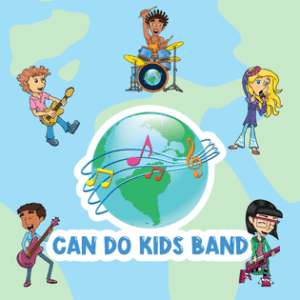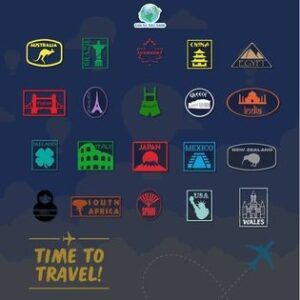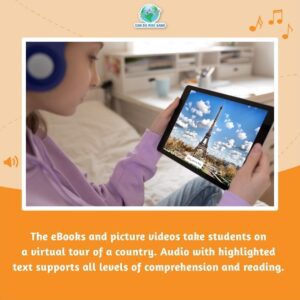Can Do Kids Worldwide
By Dr Charles Margerison
Psychologist
Learning About Countries & Cultures
How can Primary students learn about people and places beyond their own country?
Can Do Kids Worldwide provides an engaging interactive online platform to help students between the ages of 7 and 11 develop an understanding of different countries, and cultures.
It does so via the travel adventures of the Can Do Kids Band. These are five intrepid teenage musicians who tour countries and share what they learn about people and places.

– Ravi is a talented bass guitarist, and shares his knowledge of India, where he was born.
– Lin plays the piano keyboard and brings her experience of Chinese culture.
– Ace keeps the band in time using his drum skills and introduces African rhythms, reflecting his heritage.
– Amy, from the USA, is an engaging singer with a pitch-perfect voice.
– Oz, the lead guitarist, is from Australia and enjoys exploring new places.
Virtual Travel To Explore The World
In addition to touring their own countries, the Can Do Kids visit Spain, Brazil, Japan, and other countries. During their visits, they stay with students from local schools who show them their ways of life.
Students in primary schools can travel virtually with the Can Do Kids and learn about food, dress, language, dance and cultures in many communities. As a result, they acquire ‘virtual passports’ of the countries they visit.


Education Applications
Teachers have developed many innovative applications of the Can Do Kids Band online travel education resources. In particular, they have used the five minute videos on each of the countries featured, to facilitate group discussions amongst students. These discussions enable students to share what they know about the country in question, especially if they have been there on holiday or have relatives who live there. The discussions also enable the students to have friendly group competitions using quiz questions.
An example lesson of 50 minutes involves the tutor introducing the country and showing a short video. Students then meet for 15-20 minutes in groups of four or five, to discuss questions about the country. Presentations are then made by each group on the key points, and the teacher reviews the key points and assigns any follow up work.
Some interesting outcomes include:
Distances & Navigation – Students were asked to draw a map of the country visited, the USA, and indicate the places explored on their virtual tour. This provided the basis for engaging group discussions.
Outdoor Education – A teacher introduced the country and people of Brazil to her class via the Can Do Kids education resources. This led to an outdoor lesson where students looked at plants that would grow in the Amazon Forest.
Touring and Exploring – A five-minute video about Australia from the online resources was shown to a class. Students then met in groups of four or five to decide where they would like to explore and why. The discussions helped them to develop team communication skills and was followed by presentations to the whole class.
The Can Do Spirit & Perseverance
In each one of these activities, we encouraged students to show their ‘can do spirit.’ This is what all explorers and people of achievement have done.


Can do spirit can be learned. It is the mindset that enables a person to persevere, despite the problems and difficulties they may face. It involves positive thinking and persistence. It includes –
- Developing ideas.
- Testing those ideas in safe and practical ways.
- Exploring and implementing applications.
- Drawing conclusions to develop plans and priorities.
- Organizing yourself and others to take action.
- Supporting others on their can-do voyages.
- Learning from experiences and adapting.
- Setting new challenges in order to improve.
Every student needs to develop their can-do spirit and character to meet challenges on the road of life. This is reflected in the voyages of the Can Do Kids.
Improved Knowledge
As a result of using www.candokidsband.com education resources in both classroom and home study, we have found that students:-
- Widen their horizons and interests.
- Improve their ability to write about people and places.
- Develop their conversation skills.
- Have a better understanding of people from different countries and cultures.
- Understand intercultural issues and relationships.
- Learn about international affairs and travel.
In particular, students:-
- learn about people and places.
- appreciate cultural differences.
- gain relevant information before making decisions.
- see the links between school subjects and real-world applications.
- develop personal strengths.









